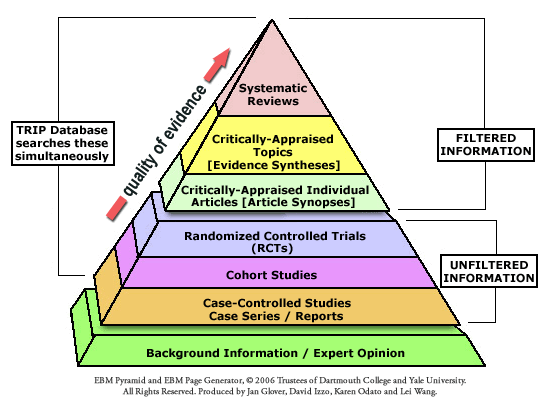What is Evidence-Based Practice
Evidence-based practice (EBP) is the judicious use of the best research evidence (found in health sciences literature), clinical expertise (what the health care provider knows) and patient values (what the patient wants and believes) to create a plan of action regarding patient care. Evidence-based practice is an umbrella term that covers evidence-based medicine, evidence-based dentistry, evidence-based public health, evidence-based nursing and etc.
Information about Practicing EBP
- Evidence Based Practice Step by StepThe purpose of these 12 articles from the American Journal of Nursing is to give nurses the knowledge and skills they need to implement EBP consistently, one step at a time.
- Glossary of Evidence-based TermsThis is not a comprehensive glossary but it outlines some of the key terms that should be understood in relation to Evidence-Based practice.
PICO for Clinical Questions
Healthcare professionals sometimes use the PICO or PICOT format to develop keywords for searching of clinical questions where:
P - Patient or Population or Problem
I - Intervention or prognostic factor of interest
C - Comparison to intervention
O - Outcome of interest
T - Type of Question (sometimes included)
For more information about forming and using a PICO question to search, please see the American Journal of Nursing article below.
-
Evidence-Based Practice, Step by Step: Asking the Clinical Question: A Key Step in Evidence-Based Practice
Stillwell, Susan B. DNP, RN, CNE; Fineout-Overholt, Ellen PhD, RN, FNAP, FAAN; Melnyk, Bernadette Mazurek PhD, RN, CPNP/PMHNP, FNAP, FAAN; Williamson, Kathleen M. PhD, RN. Evidence-Based Practice, Step by Step: Asking the Clinical Question: A Key Step in Evidence-Based Practice. AJN, American Journal of Nursing 110(3):p 58-61, March 2010. | DOI: 10.1097/01.NAJ.0000368959.11129.79
- Developing a Clinical Question through PubMedGuidance with practice scenarios on how to form a clinical question using PICO.
Research Databases
Search for PICO keywords in these databases:
CINAHL Complete This link opens in a new window
CINAHL®Complete is the world's most comprehensive nursing & allied health research database, providing full text for more than 1,300 journals indexed in CINAHL®. Of those, 822 are not found with full text in any version of Academic Search™, Health Source® or Nursing & Allied Health Collection™. This authoritative file contains full text for many of the most used journals in the CINAHL index, with no embargo
PubMed Database Advanced Search Builder
Search engine for the National Library of Medicine
Choose "PICO" on the top of the search bar and input specific terms to locate clinical research evidence.
Evaluating Evidence
- Critical Appraisal Skills ProgrammeDownloadable checklists to appraise types of evidence including RCTs, systematic reviews, cohort and case-control studies, qualitative research, economic evaluations, diagnostic tests and clinical predication rules.
- Evidence-Based Medicine: Literature ReviewsLinks to literature reviews on various health conditions and products, from aloe vera and Alzheimer's to UTIs and yoga
- How to Read and Critique a Research ArticleProvides questions and a checklist to consider whether an article answers your research question.
